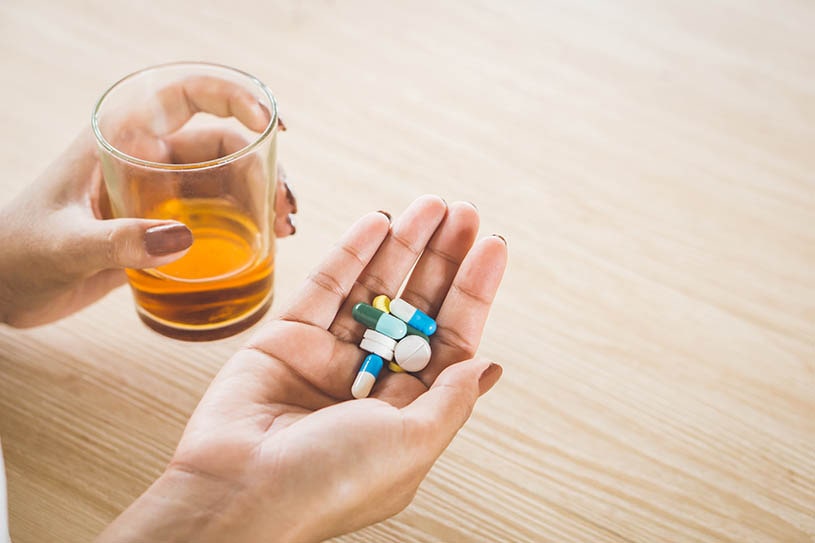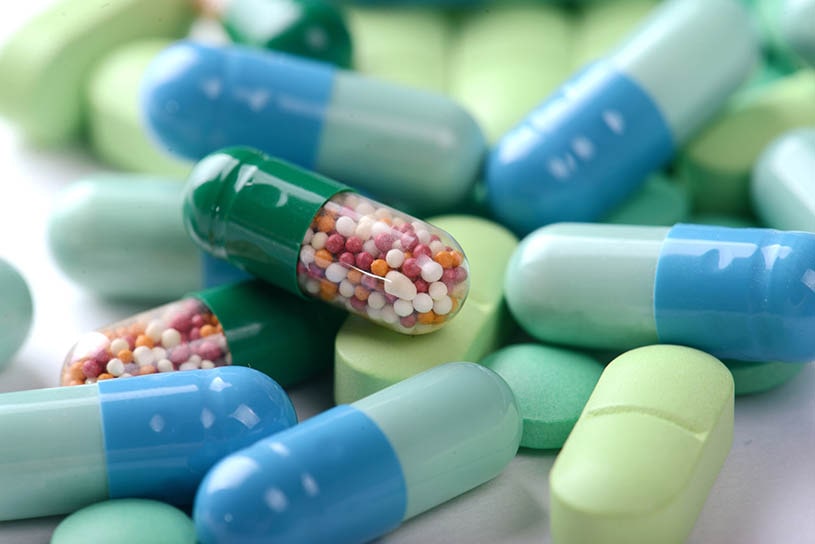Naltrexone, with the brand name Vivitrol, is a prescription medication under the drug class opioid antagonists. The primary use of this medication is for the management of the addiction of alcoholics, along with the treatment of obesity and weight gain. In 2018, around 1.1 million prescriptions of Vivitrol were issued in the United States. Generally, the use of this drug is to keep patients alcohol-free and drug-free. But what happens when this medication is mixed with alcohol or other drugs? Are there any side effects or do interactions cause dangers to the health?
Table Of Contents:
In this article, information about Naltrexone interactions such as consuming Naltrexone and alcohol together, taking Naltrexone and Marijuana at the same time, and Naltrexone interactions with other drugs like Wellbutrin will be provided.
Naltrexone For Alcoholism Treatment
Vivitrol is an FDA-approved medication that is used as a treatment for alcohol abuse and management of dependence. This is a reason why most doctors support its use and can prescribe it if needed. Aside from Vivitrol, another brand name of Naltrexone is Revia. However, remember that no matter if someone is taking the brand-name drug or its generic, the medication functions the same. The fact that Vivitrol belongs to the class of drugs known as opioid antagonists determines how this drug works. This means that it blocks the effects of any substance that acts on the opioid receptors in the body. While not considered an opiate or narcotic, alcohol also requires opioid receptors to induce the euphoric feelings that drive alcoholism. According to the American Family Physician, research suggests that the use of Vivitrol as a support drug for alcohol abuse can last several months to many years. Some patients may even take this drug for alcohol abuse for life. What treatment looks like will vary from patient to patient.
According to research, Vivitrol is an effective medication in relapse prevention of alcoholism. There are different forms of this drug such as oral and extended-release intramuscular injection. In another study, doctors find the injection route more effective than the oral one. Aside from this, patients do not need to take a daily dose of Vivitrol. Instead, patients can get their shot safely, under the supervision and support of a medical doctor.
Naltrexone And Alcohol: A Safe Combination?
The main use of Vivitrol is to make patients stop their use of alcohol. Alcoholics have a strong urge to go back on drinking and that is natural. It is a process of recovering from alcohol abuse that is why the drug Vivitrol is there to help them manage the urge they feel. Moreover, combining Naltrexone and alcohol is not prohibited, and in fact, some continue drinking on Naltrexone without any significant dangers noticed. Given that the medication curbs the pleasurable feelings that alcohol produces, in theory leading to reduced or eliminated drinking, users cannot actually experience the key effect of the drug unless they drink while using it. But that does not mean that drinking on Naltrexone is safe. There are many side effects of Vivitrol that are the same as those caused by liquor consumption, which means combining the two can compound them.

Drinking On Naltrexone: The Potential Negative Effects
In general, what happens if someone drinks on Vivitrol is not going to be life-threatening, at least not directly. Dangerous Naltrexone interactions between Naltrexone and alcohol are rare. However, they are not unheard of. The greatest direct risk comes to those who drink so heavily that their liver is damaged. Combining Naltrexone and alcohol when there is liver damage significantly increases the chance of hepatotoxicity to occur.
Other Risks To Health When Taking Naltrexone And Alcohol Together May Include The Following:
- Enhancing The Adverse Side Effects Of Both Substances – Another problem that can come from drinking while on Vivitrol is enhancing the negative side effects of both substances. Some potential side effects of Vivitrol include nausea, headaches, and dizziness – all of which can be side effects of alcohol use as well. Bringing the two substances together can cause the user to feel these effects to a higher degree.
- Remaining The Symptoms Of Alcohol Use – Finally, while drinking on Naltrexone will eliminate the euphoric feeling it produces, it does not stop the other symptoms of use. Functional impairments, like slowed reaction times, trouble thinking, and impaired coordination remain. Users, especially at the start of treatment, may feel compelled to drink more than usual in an attempt to chase the euphoria that will not come. As a result, they can end up severely impaired and may even experience alcohol poisoning.
- Risk Of Sudden Alcohol Withdrawal – There are also fewer direct risks of combining Naltrexone and alcohol. For example, once a user stops feeling benefits from drinking, they may stop using quite suddenly. This can lead to withdrawal, which can have a lot of discomforting symptoms.
Vivitrol is not addictive. However, that does not mean that users cannot abuse the drug or feel psychological dependence on it. The medication should only be used with supervision, so their physical and mental health can be monitored.
Naltrexone And Marijuana
Vivitrol is a medication that is used for the treatment process of drug addiction. Patients who are undergoing recovery take this medication to reduce their urge to use marijuana. According to research, Vivitrol can prevent relapse from drug addiction, including marijuana use. However, since recovery from drug addiction is a process, some patients still find the urge to smoke marijuana and this is very dangerous to their health. In heavy marijuana users, combining Naltrexone and maijuana together might lead to the ineffectiveness of the drug. This Naltrexone and marijuana support combination, then, might cause the patient to get back to his or her pretreatment levels for marijuana use in the event of lapse.
Naltrexone Interactions
Aside from food-drug interactions, Naltrexone interactions are also possible and there are around 530 approved drug interactions for Vivitrol. Moreover, it is important to understand that drug interactions may be considered mild, moderate, or severe. Whatever the severity is, the health of the patients using the medication will always be in danger if any drug interactions occur. In this section, information about the interaction of Wellbutrin and Naltrexone will be provided.
Wellbutrin And Naltrexone
Vivitrol is under the drug class opioid antagonists while Wellbutrin is under the drug class antidepressants. Generally, the former is used for the treatment and management of drug and alcohol abuse while the latter’s use is for the treatment of major depressive disorder. Moreover, according to research, antidepressants like Wellbutrin are also effective in managing nicotine withdrawal, alcohol abuse, and cocaine dependence just like that of Vivitrol. But, what happens when Wellbutrin and Naltrexone are mixed together?
In the Naltrexone and Wellbutrin interaction, the latter decreases the excretion rate of the former which can lead to high serum levels of Vivitrol. When this happens, there is an increased risk for patients to experience liver problems such as hepatotoxicity. Even though the combination of Naltrexone and Wellbutrin is an effective way to reduce drug and alcohol abuse, dangerous side effects to the health may still be seen such as the information below:
- Fever
- Chills
- Joint pain and inflammation
- Unusual bleeding or bruising
- Skin rashes
- Itchiness
- Loss of appetite
- Fatigue
- Nausea and vomiting
- Abdominal pain
- Dark urine
- Pale stool
- Yellowing of the skin
The side effects above are usually signs of liver damage. If any of these signs are seen, seek immediate medical help and support to save the health of the patient. Additionally, to avoid dangerous Naltrexone interactions, always tell your medical provider about the current medications you take.

What To Avoid When Taking Vivitrol
Always remember that all drugs have potential food-drug and drug-drug interactions. Therefore, patients should be cautious in using any medication just like Vivitrol. Even if Vivitrol is used to manage alcohol abuse, it cannot be said that it is always safe and accepted for patients under alcohol and drug abuse recovery to use these substances while being on the medication. This is because taking Vivitrol with alcohol or any antidepressants proposes notable side effects that are dangerous to the health, including hepatotoxicity.
Below Are Some Tips When Patients Are Currently Taking Vivitrol:
- Do not use opioid analgesics or any illicit drugs
- Do not drink alcohol
- Do not take any CNS depressants such as sedatives or tranquilizers
- Tell the doctor if the patient is experiencing allergic reactions with the use of Vivitrol
- Let the doctor know if the patient is having medical conditions such as hepatitis or hepatic failure
It is always advised to seek help from a medical doctor before choosing any medication alternative to Naltrexone, or before using them with other drugs or substances in order to protect the health of the patient. Since Vivitrol is used to manage alcohol abuse and drug addiction, patients who experience relapses or those who opt for nonmedical treatments may be admitted to the drug rehabilitation center. Special addiction treatment programs for addicts help for a personalized approach to a patient’s needs and support more coherent treatment courses. Patients will start the treatment with detox, followed by a series of therapy sessions (CBT, DBT, Motivational Enhancement, etc.).
Hope Without Commitment
Find the best treatment options. Call our free and confidential helpline
Most private insurances accepted
Page Sources
- Anton, R. F. (2008). Naltrexone for the management of alcohol dependence. New England Journal of Medicine, 359(7), 715-721.
- Bupropion: Uses, Interactions, Mechanism of Action | DrugBank Online. (2021). DrugBank. https://go.drugbank.com/drugs/DB01156
- Haney, M., Bisaga, A., & Foltin, R. W. (2003). Interaction between naltrexone and oral THC in heavy marijuana smokers. Psychopharmacology, 166(1), 77-85.
- Kane, S. P. P. (2018). Naltrexone - Drug Usage Statistics, ClinCalc DrugStats Database. ClinCalc. https://clincalc.com/DrugStats/Drugs/Naltrexone
- Kiefer, F., Jahn, H., Tarnaske, T., Helwig, H., Briken, P., Holzbach, R., ... & Wiedemann, K. (2003). Comparing and combining naltrexone and acamprosate in relapse prevention of alcoholism: a double-blind, placebo-controlled study. Archives of general psychiatry, 60(1), 92-99.
- Naltrexone: Uses, Interactions, Mechanism of Action | DrugBank Online. (2021). DrugBank. https://go.drugbank.com/drugs/DB00704
- Naltrexone for Alcoholism. (2000, March 15). American Family Physician. https://www.aafp.org/afp/2000/0315/p1891.html
- SUNY, U. (2018). Naltrexone for the Treatment of Alcohol Use Disorder in the Primary Care Setting. US Pharm, 43(8), 26-33.
- Torrens, M., Fonseca, F., Mateu, G., & Farré, M. (2005). Efficacy of antidepressants in substance use disorders with and without comorbid depression: a systematic review and meta-analysis. Drug and alcohol dependence, 78(1), 1-22.
- Trivedi, M. H., Walker, R., Ling, W., dela Cruz, A., Sharma, G., Carmody, T., ... & Shoptaw, S. (2021). Bupropion and naltrexone in methamphetamine use disorder. New England Journal of Medicine, 384(2), 140-153.

 Authored by
Authored by  Reviewed by
Reviewed by 

